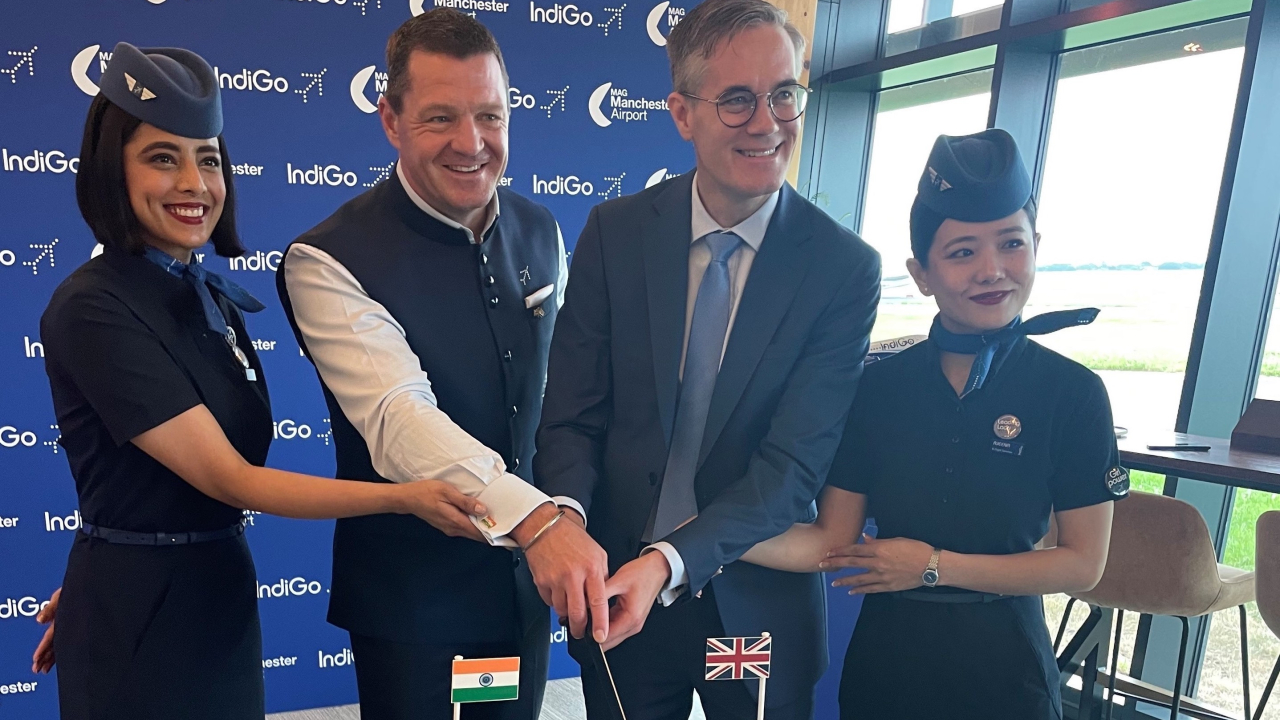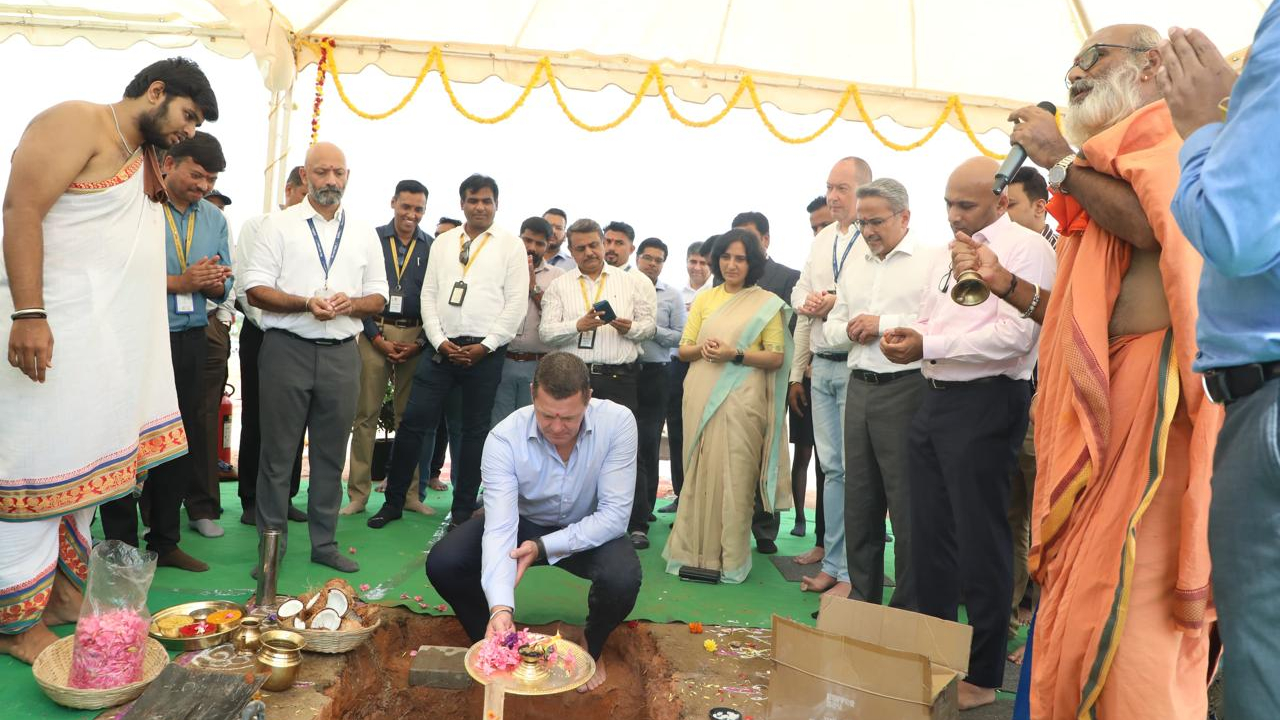Manchester delights in winning IndiGo’s new Mumbai link
The UK’s Manchester Airport fought hard to become IndiGo’s first European long-haul destination, Chris Woodroofe, managing director of Manchester Airport, told Aviation Week at the launch event.

IndiGo CEO Pieter Elbers (second left) and Manchester Airport head Chris Woodroofe, alongside IndiGo flight attendants, cut a cake to celebrate the launch of the Indian carrier’s service between Mumbai and Manchester (photo: Mark Pilling).
Woodroofe said touting the region’s large catchment area, a £1.3 billion ($1.8 billion) investment programme that has transformed the airport’s product and ample capacity as a “golden trio” of attributes that attracted the Indian carrier to Manchester Airport.
“The Manchester Airport network development team has been on a crusade to get a direct service to India for a decade,” said Woodroofe. IndiGo inaugurated a three times weekly service operating Boeing 787-9s between the northern UK city and Mumbai on 1 July.
There is an “incredibly strong” relationship between India and the UK, which will be deepened by the two countries recently signing a new free trade agreement, while in another important move the Indian Government opened a consulate in Manchester earlier this year, he noted.
“There are half a million people in my catchment area of 23 million who are of Indian heritage. We know there are 300,000 people flying annually to Mumbai today [from Manchester’s catchment] using various routes and IndiGo can go after that,” said Woodroofe.
“You need a solid 100,000 passengers [a year] to make a long-haul route work so with 300,000 we are absolutely convinced this route is going to be a success,” he said.
Woodroofe noted that the competition for IndiGo’s service was intense, as the airport battled with other European secondary cities such as Milan and Barcelona and the capitals of smaller countries. “Manchester Airport can really compete now because we’ve just transformed Terminal 2, which is where IndiGo flies from, creating a great passenger experience,” he said.
In addition, the opening of Terminal 2 means Manchester, which has two runways, has the terminal capacity to handle 45 million passengers, he noted. The airport handled 31.1 million passengers in its financial year to the end of March 2025, an 8% rise over the previous year. This is the first time it has exceeded 30 million passengers in a calendar year.
Woodroofe, who became the managing director in mid-2022, has overseen the renovation of the airport. “My commitment to our board was if you give me the money to transform Manchester Airport then we will grow it,” he said.
“While the catchment has historically been strong the product hasn’t been. Now it is and that helps to build our competitive edge, and we can hold our head high amongst our European competitors,” he stated.
“We are proud to be the global gateway to the north [of the UK] where over 50 airlines connect to over 200 destinations,” said Woodroofe.
The airport is forecasting traffic growth of 3% this year, but as the investment programme concludes the ambition is to accelerate and reach 37 million passengers annually by 2030, with a stretch target of 40 million, he said.
Connecting in Mumbai
Speaking about the new Mumbai service, IndiGo CEO Pieter Elbers stressed that this route and its other European launches are designed to create strong connecting traffic flows over its Mumbai hub.
“The geographical position of India has long been taken by others when it comes to creating great transfer hubs,” said Elbers, referring to the hubs created by the Gulf carriers.
IndiGo’s large domestic network to and from Mumbai plus its widening range of destinations in south-east Asia, the Gulf and South Asia, give multiple connectivity options for travellers.
Continuously adding to its Indian domestic network and adding regional connectivity are the “building blocks” created by IndiGo’s strategy to develop its “Indian foundations”, said Elbers.
“So, the moment we plug in new long-haul flights like this one it is not to Mumbai only, it also connects to all these dozens of Indian destinations from Mumbai,” he noted.
At the Manchester end of the route, IndiGo is finalising partnership deals with Virgin Atlantic and Delta Air Lines with the emphasis on transatlantic route connections. These partnerships will “really help us to address some of the seasonality in the market”, added Elbers.
Although the Mumbai-Manchester service only had 27 booking days from its announcement, the initial loads were healthy, and forward bookings are “very positive”.
“The market response is good, and we are not spending millions on marketing,” said Elbers. “We have a very pragmatic approach at IndiGo on doing these things.”
The Manchester launch, and that of Amsterdam the following day, are “part of a holistic strategy, vision and objective,” stated Elbers.
“That objective is we become a global aviation giant by 2030. To achieve that [we think about] how we deal with codeshares, how do we build up certain destinations?”
“For some of these things, you can spend half your life studying and making the analysis. I feel at IndiGo we have a great can-do mentality [where] we start to implement it, and we'll refine it later.”
The launch of Manchester and Amsterdam will help IndiGo develop its international strategy and it will learn and adapt, explained Elbers.
“They will help us better understand how to build on some of that connectivity, where can we be stronger and where we can fine tune our distribution,” he said.
Stay up to date
Subscribe to the free Times Aerospace newsletter and receive the latest content every week. We'll never share your email address.

